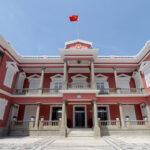
The Chief Executive, Mr Ho Iat Seng, today sincerely thanked the Central Government for its support over the implementation of ‘closed customs operations’ – after the stroke to midnight 1 March 2024 – for the Guangdong-Macao Intensive Cooperation Zone in Hengqin.
The Macao Special Administrative Region (MSAR) Government will fully cooperate regarding – and follow up on the relevant work for – such a step, striving to live up to the high expectations and trust placed in Macao by President Xi Jinping and the Central Government. The MSAR Government will employ utmost effort to achieve this year the development goals of the first phase of the Cooperation Zone.
Today, the Cooperation Zone’s Executive Committee and the Office for the Cooperation Zone under the Guangdong Government announced closed customs control in the “second-tier” zone, with effect from 1 March.
The area between Hengqin and the MSAR is regarded as the “first-tier” zone, while the area between Hengqin and other areas within the mainland is regarded as the “second-tier” zone.
The latest step is in line with the Master Plan of the Development of the Guangdong-Macao Intensive Cooperation Zone in Hengqin and the Overall Development Plan for the Guangdong-Macao Intensive Cooperation Zone in Hengqin. It has also been approved by the Cooperation Zone’s Administrative Committee.
The Chief Executive said the introduction of the Overall Development Plan created more favourable conditions to scale up Macao’s appropriate economic diversification. The move to introduce closed customs operations at the Cooperation Zone was of great significance in building a new system of high-level exchange for the further integration of Macao and Hengqin.
A number of policy documents regarding the Cooperation Zone will become effective from the date closed customs operations takes effect. They include: the notice on tax policies regarding import and export of goods; the notice on tax policies regarding personal luggage and postal items; the notice on adjusting the scope of VAT- and consumption tax-refundable goods; and the regulation of the General Administration of Customs of the People’s Republic of China (China Customs) on the supervision of the Cooperation Zone. They also include the announcement on simplified declaration requirements for duty-free goods; and the measures of China Customs on the collection and administration of domestic sales tax on processed value-added goods.
Mr Ho thanked the Central Leading Group for Regional Coordination and Development, the Ministry of Finance, China Customs, the State Taxation Administration, and other ministries and departments of the Central Government.
In addition, a series of documents will be released furthering the implementation of the “first-tier” relaxed customs administration and the “second-tier” strict customs control. They will include: the determination of the origin of goods and their tax payment status for items exiting the “second tier”; allowing eligible Macao residents to carry animal and plant products through the “first-tier” into the Cooperation Zone; as well as oversight of credit information management. These efforts would facilitate further convenience regarding movement of people, goods, capital, and information, between Macao and the Cooperation Zone, accelerating the development of the Cooperation Zone, added Mr Ho.
The Chief Executive stressed that the MSAR Government would work closely with the Cooperation Zone’s Administrative Committee, in order firmly to grasp the opportunities brought by the unique regulatory system designed by tier district. The two sides would spare no effort to develop the Cooperation Zone into a high-level exchange area with Chinese characteristics, and that highlights the advantages of the “One country, two systems” principle, and thereby supports Macao’s appropriate economic diversification.
In tandem, the MSAR Government would step up promotion efforts to ensure that the Cooperation Zone’s achievements were tangible and visible to the Macao community, allowing Macao residents truly to experience the level of policy support provided by the Central Government.


